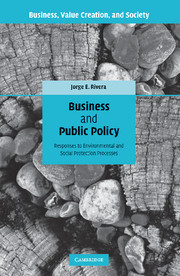Book contents
- Frontmatter
- Contents
- List of figures
- List of tables
- Foreword
- Acknowledgments
- Publication acknowledgments
- 1 Introduction
- 2 Business responses to the protective policy process in the US
- 3 Country context and the protective policy process–business response relationship
- 4 Firm-level characteristics and business responses to environmental/social protection demands
- 5 Is greener whiter? Resistance strategies by the US ski industry
- 6 Is greener whiter yet? Resistance or beyond-compliance by the US ski industry
- 7 Institutional pressures and proactive environmental protection: evidence from the Costa Rican hotel industry
- 8 Chief executive officers and proactive environmental protection: evidence from the Costa Rican hotel industry
- 9 Certified beyond-compliance and competitive advantage in developing countries
- 10 Conclusion
- References
- Index
Foreword
Published online by Cambridge University Press: 03 May 2011
- Frontmatter
- Contents
- List of figures
- List of tables
- Foreword
- Acknowledgments
- Publication acknowledgments
- 1 Introduction
- 2 Business responses to the protective policy process in the US
- 3 Country context and the protective policy process–business response relationship
- 4 Firm-level characteristics and business responses to environmental/social protection demands
- 5 Is greener whiter? Resistance strategies by the US ski industry
- 6 Is greener whiter yet? Resistance or beyond-compliance by the US ski industry
- 7 Institutional pressures and proactive environmental protection: evidence from the Costa Rican hotel industry
- 8 Chief executive officers and proactive environmental protection: evidence from the Costa Rican hotel industry
- 9 Certified beyond-compliance and competitive advantage in developing countries
- 10 Conclusion
- References
- Index
Summary
In this book, Jorge Rivera makes a very important contribution to our emerging knowledge about how private strategies and public policies interact to advance the cause of sustainability. By looking across theories (e.g., institutional theory and policy sciences) and country contexts (developed and developing) he is able to generate important new insights that should help inform future action.
First, he clearly documents and illustrates the “dance” that exists between business and government when it comes to the policy process. Rivera shows that companies both influence and are influenced by the policy process. He posits an inverted U-shaped relationship, with increasing resistance from business as the process moves from initiation to selection, and thereafter, declining resistance that turns into growing cooperation in implementation. Corporate behavior is not the simple result of a one-way flow of isomorphic pressure as the neo-institutionalists might have us believe.
Even more importantly, Professor Rivera proposes that country matters when it comes to business resistance to environmental and social policies, with countries with lower levels of democracy and income per capita evincing more business resistance to environmental and social policy. Other things being equal, this would tend to suggest that “developing” countries would show more business resistance to such policies than “developed” countries, the result being poorer environmental and social performance. However, Rivera also shows us that the actual design of the policy might be more important than the country characteristics.
- Type
- Chapter
- Information
- Business and Public PolicyResponses to Environmental and Social Protection Processes, pp. xii - xiiiPublisher: Cambridge University PressPrint publication year: 2010

